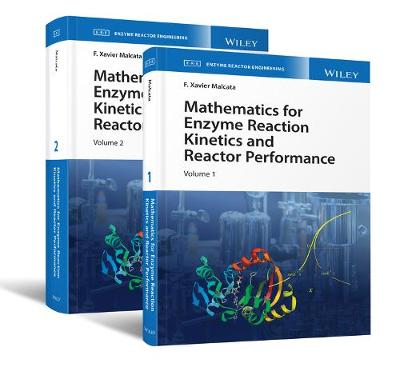Enzyme Reaction Engineering
4 total works
Enzyme Reaction Kinetics and Reactor Performance 2 V Set
by F. Xavier Malcata
Comprehensively introduces readers to modelling of rate of enzymatic reactions, including effects of physicochemical parameters
Analysis of Enzyme Reaction Kinetics is the second set in a unique eleven-volume collection on Enzyme Reactor Engineering. It describes rate expressions pertaining to enzymatic reactions, including modulation by physicochemical factors, as well as tools for prediction and control of how fast substrates are transformed to products. Volume 1 details rate expressions mathematically derived from mechanistic postulates, and is complemented by appropriate statistical approaches to fit them to experimental data. Volume 2 discusses the effects of physical and chemical parameters upon the rates of both enzyme-catalyzed and enzyme-deactivation reactions.
Starting with basic concepts and historical perspectives, the first volume introduces readers to the mathematics of rate expressions. It then goes on to cover kinetic features and the many forms of Michaelis & Menten's-type rate expressions (single and multiple enzymes, autocatalysis, single and multiple substrates, multiphasic systems, etc.), and concludes with the statistical analysis of rate expressions - including the assessment of data, fitting of models to data, and generation of data themselves. The second volume introduces readers to physicochemical modulation of reaction rate - starting with basic concepts, and looking specifically at temperature-, mechanical force-, pH- and compound-driven effects: both unimodal and bimodal deactivation are considered.
Analysis of Enzyme Reaction Kinetics 2V Set is a comprehensive work for those studying or working with enzyme reactions, or practitioners involved in the control of reactors.
SERIES INFORMATION
Enzyme Reactor Engineering is organized into four major sets: Enzyme Reaction Kinetics and Reactor Performance; Analysis of Enzyme Reaction Kinetics; Analysis of Enzyme Reactor Performance; and Mathematics for Enzyme Reaction Kinetics and Reaction Performance.
Mathematics for Enzyme Reaction Kinetics and Reactor Performance, 2 Volume Set
by F. Xavier Malcata
Mathematics for Enzyme Reaction Kinetics and Reactor Performance is the first set in a unique 11 volume-collection on Enzyme Reactor Engineering. This two volume-set relates specifically to the wide mathematical background required for systematic and rational simulation of both reaction kinetics and reactor performance; and to fully understand and capitalize on the modelling concepts developed. It accordingly reviews basic and useful concepts of Algebra (first volume), and Calculus and Statistics (second volume). A brief overview of such native algebraic entities as scalars, vectors, matrices and determinants constitutes the starting point of the first volume; the major features of germane functions are then addressed. Vector operations ensue, followed by calculation of determinants. Finally, exact methods for solution of selected algebraic equations – including sets of linear equations, are considered, as well as numerical methods for utilization at large.
The second volume begins with an introduction to basic concepts in calculus, i.e. limits, derivatives, integrals and differential equations; limits, along with continuity, are further expanded afterwards, covering uni- and multivariate cases, as well as classical theorems. After recovering the concept of differential and applying it to generate (regular and partial) derivatives, the most important rules of differentiation of functions, in explicit, implicit and parametric form, are retrieved – together with the nuclear theorems supporting simpler manipulation thereof. The book then tackles strategies to optimize uni- and multivariate functions, before addressing integrals in both indefinite and definite forms. Next, the book touches on the methods of solution of differential equations for practical applications, followed by analytical geometry and vector calculus. Brief coverage of statistics–including continuous probability functions, statistical descriptors and statistical hypothesis testing, brings the second volume to a close.

